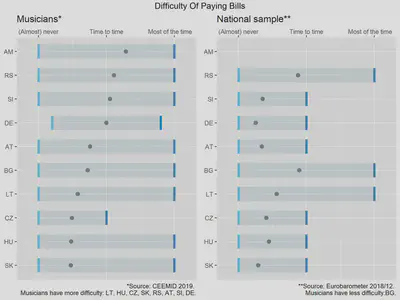Surveying Better Gender Diversity Within the Music Industry and Audiences
Recycling existing surveys and comparing results across countries, occupational groups, and time
In this case study, we will collect responses in English and Italian among music professionals and fans on LineCheck, and compare their answers with 10,000s of answers from their countries, from other occupational groups, and other countries.
How to fill out this survey?
- EN on Google Forms (will be our free tool)
- IT su Google Forms (sarà il nostro strumento gratuito)
- SurveyMonkey can be more suitable for more languages.
Table of Contents
What are the benefits of recycling and harmonizing surveys?
Surveyharmonies allows you to make more, bolder, and better-supported statements for your argument. Our technology vastly improves the quality and the inferential capacity of your surveys.

Who we are asking?
We are asking music professionals in almost 100 artistic, technical or managerial roles. The way we form the questions make your answers comparable to the worlds largest database of musicians’ (anonymous) income and working condition database, and many non-music specific survey programs, such as Eurobarometer or the European Values Survey.
What are we asking?
We are asking questions that have been asked before. We created a small demonstration survey to show how we can better understand gender diversity in the music sector. We will anonymously record your answers, and connect them to the answers of more than 28,000 people who answered these questions earlier.
How to fill out this survey?
- EN on Google Forms (will be our free tool)
- IT su Google Forms (sarà il nostro strumento gratuito)
- Both lanugages on SurveyMonkey (free for now)
In your opinion, are inequalities between women and men nowadays very widespread, fairly widespread, fairly rare or very rare in the country where you live?
This question was asked in the Eurobarometer 82.4: The European Parliament, Autonomous Systems, Gender Equality, and Smoking Habits, November-December 2014.Eurobarometer 82.4 survey
And within the music business or music non-profit sector of your country?
We are asking And within the music business or music non-profit sector of your country, are inequalities between women and men nowadays very widespread, fairly widespread, fairly rare, or very rare in the country that you chose (where you live and work?) to gain more insight about the potential differences within the music sector and the country where the music professional lives.
In your opinion, in your country, in the year around 2030, do you think that …?
- The image of women will be less stereotyped in the media (compare)
- Men and women will earn the same pay (compare)
- Men will take care of more household and family tasks (compare)
- Women will be more represented among Heads of State and government (compare)
- Women will be more present in traditionally masculine professions (compare
- Acts of violence against women will have decreased (compare)
- Women’s rights in developing countries will be better recognised (compare)
This question was asked in the Eurobarometer 72.2: Nuclear Energy, Corruption, Gender Equality, Healthcare, and Civil Protection, September-October 2009.Eurobarometer 72.2 survey in 2009.
This means that we can compare what different occupational groups, men and women, different age groups answered to this question. In 2009, 2030 was a long way many years ahead, but not any more. We could ask this question in two different ways again. We could ask what people think about 2040 to have a similar perspective, or re-ask how they think about 2030 which is only 8 years away by now.
See our earlier blogposts: